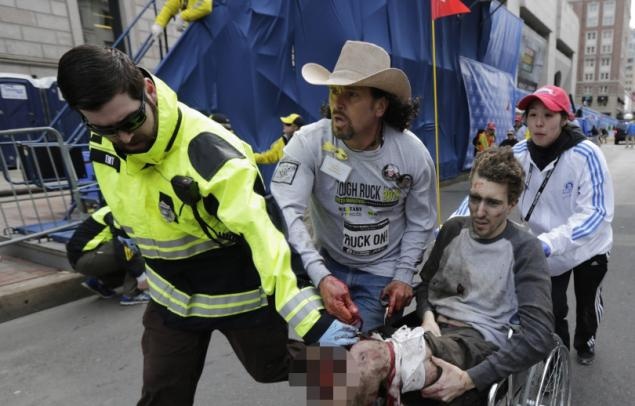Altered Lives: Boston's Wounded
“I know from personal experience what Jeff Bauman is likely to be going through,” writes BBC producer and Dart Center Ochberg Fellow Stuart Hughes.

Among the visceral images published in the hours following last Monday’s explosions at the Boston Marathon, one photograph in particular left me feeling as though I had been winded. Taken by Charles Krupa from AP, it shows Jeff Bauman, bloodied and ashen-faced, being rushed away from the scene in a wheelchair.
The image is so graphic and shocking that most news organisations cropped the frame tightly. The original photograph, though, shows Bauman’s left leg blown off below the knee, his tibia jutting out like a tree branch, the skin around it flayed.
Both of Jeff Bauman’s legs were subsequently amputated. At least thirteen people lost limbs in the blasts.
.jpg)
A good deal of the coverage in the days following the Boston Marathon explosions has focused on the futures for those who lost arms and legs in the blast.
Sadly, I know from personal experience what Jeff Bauman and the other survivors of the Boston attack are likely to be going through. I lost my right leg below the knee in a landmine explosion while reporting on the war in Iraq for the BBC ten years ago this month.
As both a journalist and an amputee I have been largely impressed by the way news organisations have approached the issue of limb loss in recent days. The personal testimonies of fellow amputees such as Jothy Rosenberg have given a first-person perspective on the reality that the survivors in Boston are beginning to grapple with. Reporters have rightly highlighted the huge advances in prosthetic technology in recent years, which are enabling amputees like me to live full, active and fulfilling lives.
The message articulated by prosthetist John Fergason in one USA Today report is key: "Don't lose hope...Life will be different. Life is not over."
.jpg)
For journalists reporting on individuals who have lost limbs, my advice is to treat them with the same sensitivity that you would give to someone who has lost a close relative.
The psychological effects of limb loss are similar to those encountered when a loved one dies. Amputees go through a grieving process, often marked by the classic stages of denial, anger, bargaining and depression before final acceptance.
Changes in the way amputees perceive themselves and their bodies can sometimes lead to psychiatric conditions such as anxiety, depression and sexual problems. This can delay and complicate recovery and rehabilitation.
In the worst-case scenario, individuals who have lost a limb can become overwhelmed by a sense of hopelessness and the belief that their life is over.
Each person robbed of an arm or a leg in the Boston Marathon explosions will react differently, depending on their own inner resources, the psychosocial support available to them and the level of their amputation. Some will find it easier to adapt physically and psychologically than others. The recovery process for those who have lost more than one limb, or have lost legs above the knee, will be much longer and more challenging than that of below-knee amputees. Secondary injuries, such as burns and shrapnel lacerations, can sometimes be more serious and difficult to treat than the amputations themselves.
Rehabilitation and physiotherapy is physically and emotionally draining and survivors will need time, space and rest to enable their broken bodies to heal. Their moods may shift for some time to come, from elation at being alive, to anger and frustration at their injuries before hopefully finally reaching a state of stability and acceptance. In my own case, I was eager to share my story with fellow journalists in the days after returning from Iraq. After a few weeks, however, I chose to step back and focus on my recovery and on spending time with my family, who had also been through a hugely traumatic experience.
I personally have little patience for the overly cautious language that can sometimes creep into the reporting of disability issues. But as someone who has been affected physically and psychologically by limb loss, I always insist that journalists who write about my experience refrain from using one particular word: victim.
Amputees are not “victims.” We are survivors.

































































































